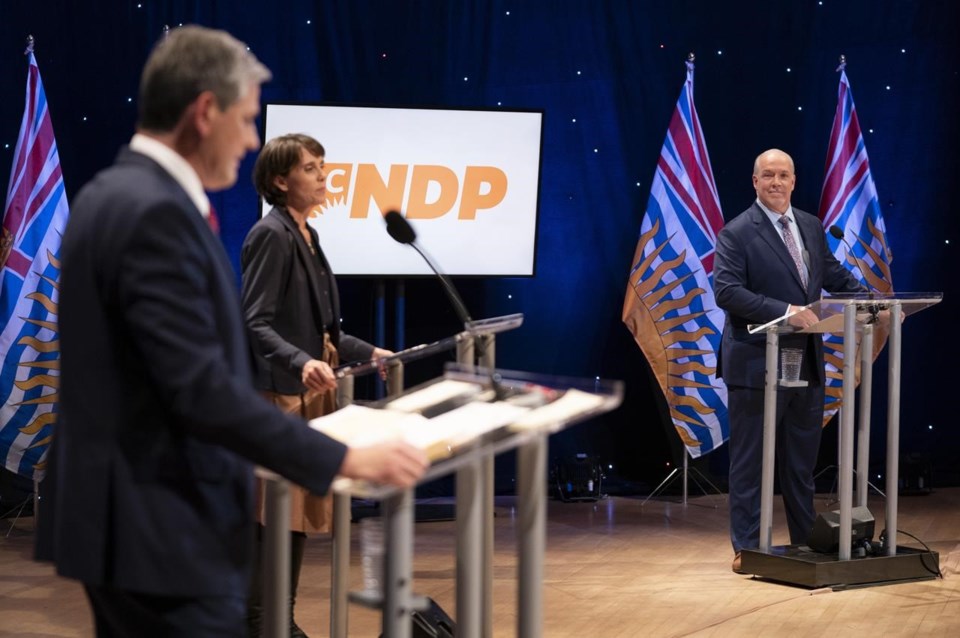VANCOUVER — NDP Leader John Horgan says he regrets making hurtful comments in answering a question about white privilege during the leaders debate in the B.C. election, while Liberal Leader Andrew Wilkinson acknowledged the advantages he has because he is a white male.
Both party leaders were asked Wednesday about their answers in the debate the previous evening after being criticized for their responses.
Horgan shared his experience playing lacrosse as a youth, telling the debate moderator he doesn't see colour.
On Wednesday, Horgan said he needs to be reminded daily that he does not face the challenges of systemic racism that many others do.
"As a personification of white privilege, I misspoke, words matter," he said at a campaign stop at Richmond. "I deeply regret it, but I'm also committed to making sure that every day I'm reminded of the discomfort that I cause to people and I will work to correct that."
Horgan said he did not intend to hurt people with his debate comments.
“I was jolted out of my comfort last night and I’m going to reflect on that," he said. "I profoundly regret that I alienated and hurt people last night.”
In an earlier statement on Twitter, Horgan said he wished he had given a different answer during the debate when the three party leaders were asked how they have reckoned with white privilege.
"Saying 'I don’t see colour' causes pain and makes people feel unseen," he wrote. "I’m sorry. I’ll never fully understand, as a white person, the lived reality of systemic racism. I’m listening, learning, and I’ll keep working every day to do better."
At the debate, Wilkinson discussed his time working in rural B.C. as a doctor in Indigenous communities, saying all people must be treated equally.
He expanded on his comments Wednesday at a campaign stop in Kitimat.
"In medical practice, I became very much aware of the particular struggles of Indigenous people in dealing with the health-care system and in dealing with society's other structures," Wilkinson said. "The idea that people in our society are somehow treated differently because of the colour of their skin or where they grew up or who their parents are is not acceptable."
He said he grew up fortunate as a white male and it wasn't until his teenage years that he realized he received different treatment than others.
"It's wrong. It's not fair," said Wilkinson. "I've suggested in the (Liberal) platform there should be anti-racism training for everybody in the provincial government."
He said that training would include elected people.
The Green party's Sonia Furstenau said at the debate she cannot comprehend that some mothers tell their children to be wary of the police. She pledged to work to end systemic racism, but admitted neither she nor the other two party leaders could ever grasp its nuances.
Prof. Annette Henry of the University of British Columbia's Institute for Gender, Race, Sexuality and Social Justice said she believes Furstenau gave the strongest answer in the debate, but Wilkinson and Horgan didn’t seem to understand what systemic racism is.
"I don't really think they understand how they are implicated in everyday systemic racism and how the structures that we live in prevent people from access, prevent people from opportunities, prevent people from being educated, from getting adequate health care from getting adequate housing," she said.
Lama Mugabo, a community engagement co-ordinator for the Hogan's Alley Society, which advocates for Black people in Vancouver, said he wants a premier who sees colour.
"When you say you don't see colour, what does that really mean?" he said. "I don't want people not to see that I'm Black. I want them to appreciate that I'm Black and recognize my Blackness. I don’t want any special treatment, but I want to be acknowledged as such.”
— By Dirk Meissner in Victoria and Amy Smart in Vancouver.
This report by The Canadian Press was first published Oct. 14, 2020.
The Canadian Press



